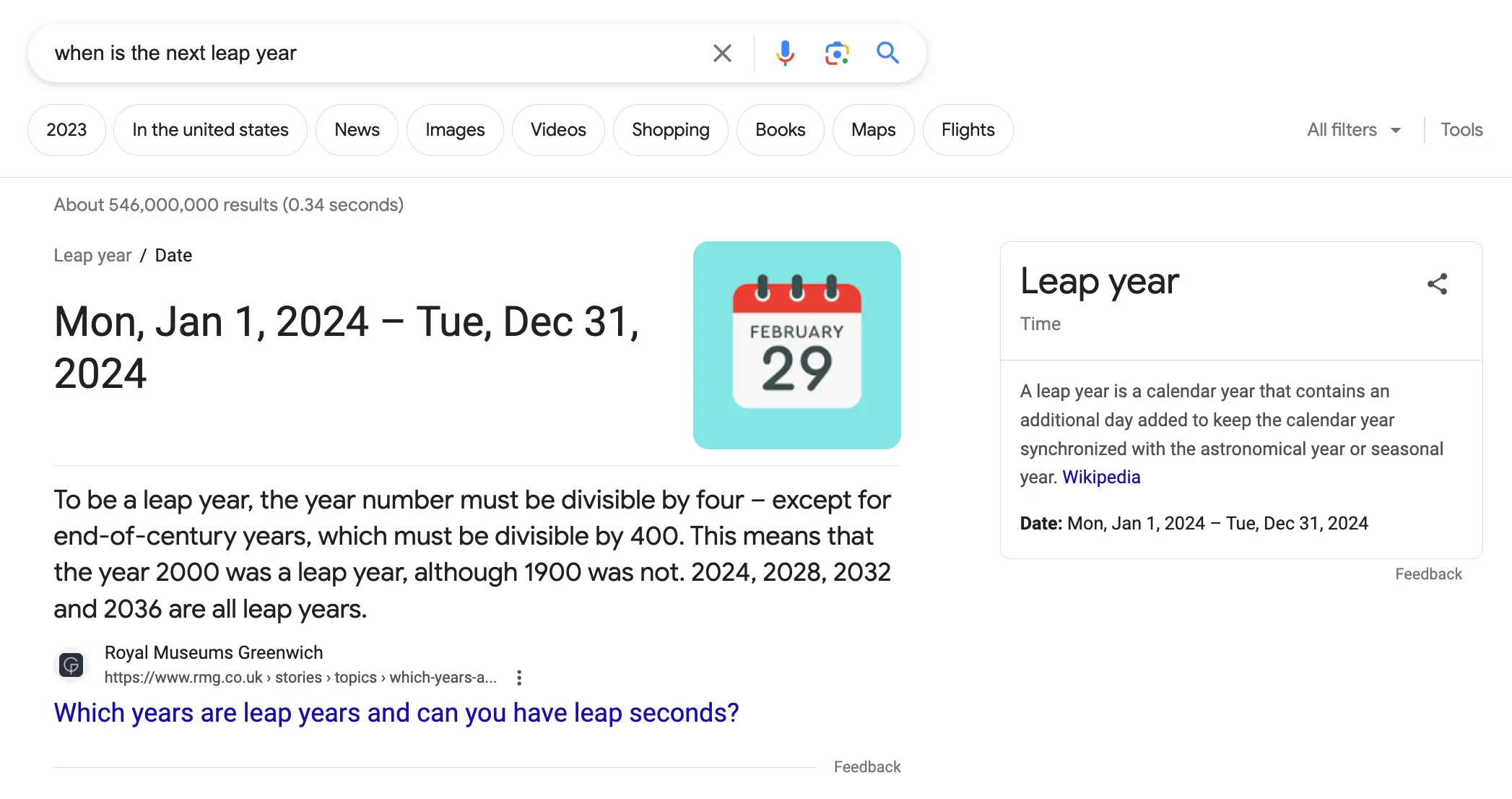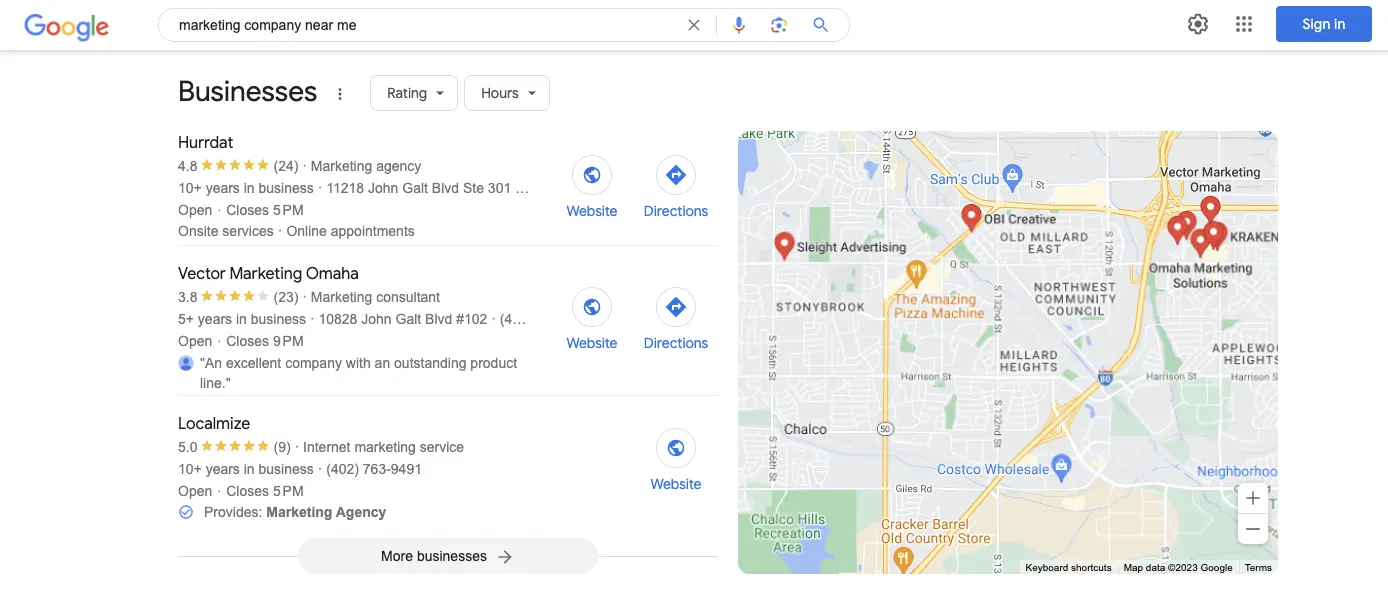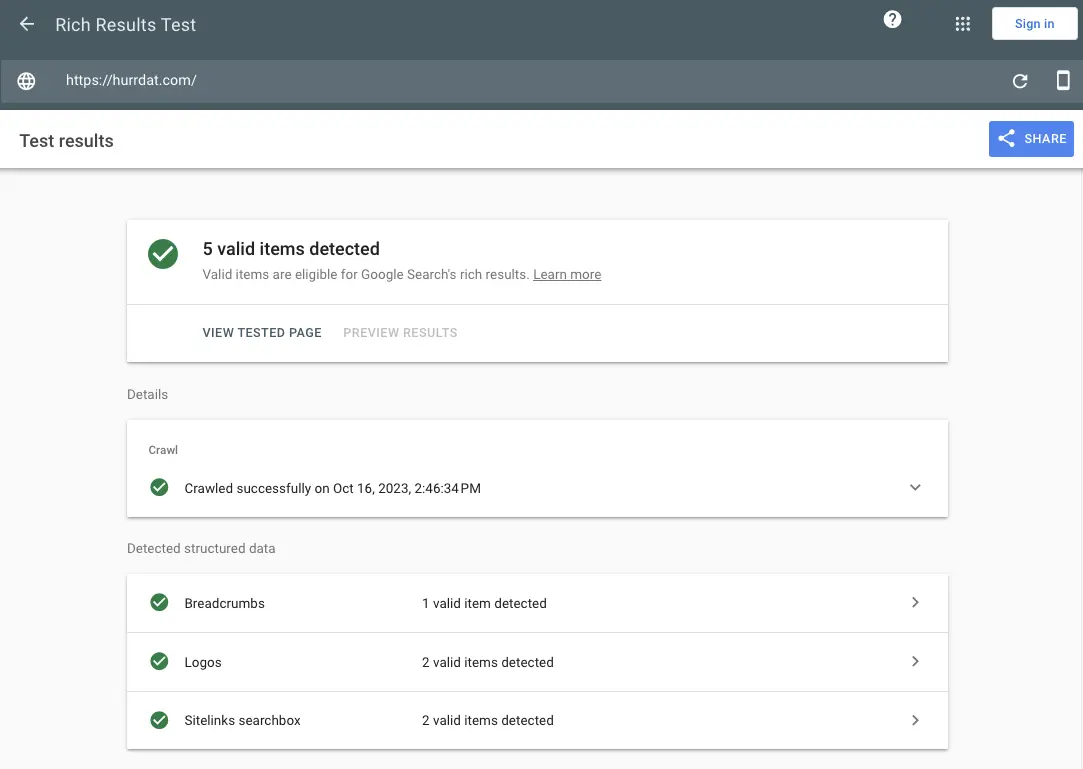In recent years, as many as 57% of mobile and 53% of desktop users don’t click on any results on the search engine results page (SERP)—and this percentage has been consistently rising. By adapting to the rise of zero-click searches, your business can continue reaching new audiences and growing its digital presence. Learn about the impact of zero-click searches and how to start implementing zero-click SEO into your digital marketing plan.
- Understanding Zero-Click Searches
- The Impact of Zero-Click Searches on Businesses
- Adapting Your Business to Zero-Click Searches

Understanding Zero-Click Searches
A zero-click search—also known as a no-click search—occurs when a SERP displays the answer to a user’s query at the top of the page, removing the need to scroll through results and click through to a third-party link. For example, if you search for something like “when is the next leap year,” you can see the answer displayed at the top of the SERP, without having to click on an organic or paid search result.
 Zero-click search results are SERP features, a unique display on Google’s results page—like in a knowledge panel, featured snippet, news box, or local pack. These results aim to answer a searcher’s query faster and easier than ever for the best user experience.
Zero-click search results are SERP features, a unique display on Google’s results page—like in a knowledge panel, featured snippet, news box, or local pack. These results aim to answer a searcher’s query faster and easier than ever for the best user experience.
The Impact of Zero-Click Searches on Businesses
Zero-click searches and their prominence have made it necessary for businesses to adapt to the shifting SEO landscape. Historically, organic click-through rates (CTR) have been one of the most effective ways to drive traffic to your business. Over the years, however, users have increasingly prioritized instant gratification.
As searchers receive more immediate information from zero-click results like featured snippets, they’re less likely to click on third-party links. This causes a decrease in organic click-through rates for websites and, potentially, in overall website traffic. If your page isn’t in position zero for zero-click queries, your visibility and web performance will suffer significantly. Decreased website traffic also means fewer opportunities for people to complete a purchase on your site or subscribe to your newsletter. So, these changes make it even more difficult for your business to have a successful SEO strategy that converts.
Adapting Your Business to Zero-Click Searches
Because search engine optimization best practices are always changing, adaptability is key. Google is rolling out generative AI searches, which will once again change how business thinks about SEO. Here are three ways you can adapt your digital marketing efforts to work with and around zero-click searches:
- Diversify your presence beyond search engines with social media and email marketing campaigns to retain relevancy across multiple platforms. Branching out helps establish experience, authority, and trustworthiness over time, which are all critical for Google’s E-E-A-T search ranking guidelines.
- Aim for position zero in relevant zero-click searches.
- Be more strategic in targeting search terms that will generate clicks.
For all options, you’ll want to regularly track website metrics and conduct customer analysis to better understand user intent and refine your approach accordingly.
Strategies for Zero-Click Searches
Neglecting zero-click searches can negatively impact your business’ SEO, so it’s best to take advantage of zero-click searches to build brand authority and help your business stand out in crowded search results. Here are a number of strategies businesses can implement to better target high-potential keywords and reach position zero.
Optimize Content for Featured Snippets
Instead of always optimizing your content and keywords to increase website traffic or organic positioning, you’ll want to optimize with the SERP itself in mind. Draft the type of content that dominates featured snippets by structuring key information in easily digestible ways. This includes answering the 5 Ws (who, what, when, where, and why), providing informative how-tos, making price/cost breakdowns, and more. You’ll also want to include visual components—such as photos, videos, and infographics—to potentially snag spots in the image pack and video carousel. Adjusting your content to accommodate Google’s algorithm can help you earn favorable positioning over competitors.
Focus on Local Search Optimization
Zero-click heavily overlaps with local search, with nearly 46% of all Google searches focused on local information. So, your business should follow a local SEO strategy that includes setting up a Google Business Profile. This way, you can manage how your business appears on SERPs and on Google Maps, and better establish your brand identity across digital platforms.
Optimize your Google Business Profile by listing up-to-date hours and contact information, accurate business categories, a link to your website, and other helpful information. Having accurate, consistent details here and across all your online listings can help your business earn coveted spots in the map pack on SERPs. In turn, zero-click searches relevant to your business and location—as in “marketing company near me”—can help generate foot traffic to your business from local users who see your listing featured on the SERP.

Provide Comprehensive & Valuable Information
Reaching a larger audience doesn’t mean sacrificing quality for quantity. Only the most helpful results reach the top of a search engine’s page, and publishing relevant and authoritative content is one of the best ways to be helpful to users (and therefore increase your ranking). Double-check your grammar, provide thorough and easy-to-understand explanations, and produce original content. Timely content is also a tell-tale sign of a website’s relevancy, so make sure to regularly update your webpages.
Leverage Structured Data Markup
Search engine optimization encompasses more than targeted phrases and keywords. Creating and adding structured data with schema markup for content that goes beyond standard links—such as carousels, imges, and other visual media—can boost your search authority and click-through rates, and give you a higher likelihood of reaching position zero. Structured data also helps search engines better understand your content and display it more appropriately in search results and SERP features.
Use Google’s Rich Results Test to validate structured data and see what rich results can be generated by your website.

Strategies for Earning Clicks
In addition to earning featured snippets for zero-click searches, you’ll likely also want to continue earning clicks and traffic to your site, especially if your website is a core part of your conversion funnel. If clicks are your goal, you’ll want to refine your keyword research process to avoid no-click searches and find users who are looking for more in-depth answers.
Rather than focusing on broad keywords with existing snippets, target keywords that offer a higher potential for clicks. Look for keywords that don’t cater to quick, easy answers and have results pages without many SERP features. Though this could include a few different keyword types, you may find it helpful to focus on long-tail keywords that match a more specific user intent. This will help you avoid overly competitive keywords designed to drive zero-click searches so you can instead boost your search authority from users seeking a more thorough discussion on a topic.
Need help adjusting your business’ SEO strategy to accommodate zero-click searches? Hurrdat’s content marketing and SEO services can help you keep up with best practices and improve your content on important platforms. Contact us today to learn more!



